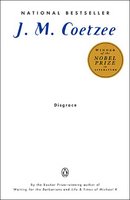Book report: Disgrace
 Nothing feels less appropriate to be reading when going to interview for a job at a girls' high school than reading a book on the plane about an old teacher who seduces his student without remorse (combine that with the Kim Basinger "Door in the Floor" stuff, and it just gets plain wrong).
Nothing feels less appropriate to be reading when going to interview for a job at a girls' high school than reading a book on the plane about an old teacher who seduces his student without remorse (combine that with the Kim Basinger "Door in the Floor" stuff, and it just gets plain wrong).But there I was, with J.M. Coetzee's Disgrace. It's set in post-Apartheid South Africa, and Coetzee writes with candor and misery about the state of race relations there.
The prose is simple. It reminds me a bit of Hemingway, but also of what little I know of the way sub-Saharan Africans speak. The sentences are short and direct, like Hemingway, but more rich and weighted. It's a style that permeates both the dialogue and narration of the book.
As for the plot, it's rather ordinary: old fogey teacher with lust problem seduces student, lacks guilt, ends up being punished in unexpected (to him) ways. The simplicity of the prose may work against the minimalist simplicity of the plot, where everything that happens serves as a lesson. The teacher must leave the university, so he goes to live with his hippie daughter on her farm. There, they are attacked, she is raped, and he is disfigured (let symbolism rain down upon us).
The use of dogs--the daughter runs a kennel, the teacher "lowers" himself to volunteer at an animal clinic, only to end up having an affair with the woman there and then befriend a disfigured (symbolism? maybe? perhaps?) dog, then he lets the dog be killed--is a bit more nuanced than Old Yeller, but Coetzee doesn't seem to be putting in much effort.
This book won the Booker Prize, and Coetzee has since won a Nobel Prize. I may read more of his stuff to see if people don't just get these awards for writing about "important" topics, like the Oscars for foreign films going to unoriginal stories set in "exotic" and "troubled" places. Here's a white man telling it like it is for white and blacks in South Africa, let's give him a million dollar prize. That seems fair.





7 Comments:
Jeff, dude - did you really not like the book? I was held spellbound while reading it. I thought the prose was hypnotic - and I was truly shocked by the events, esp starting around Chapter 11. Your comments seem to suggest a criticism about a white man writing about S.A. Please elaborate. I thought Coetzee's portrayal of a clueless white man who "thinks he's solved" his problems "rather well" to be a very apt metaphor for modern day SA. Also: I thought the book was hilarious.
JK in Chicago
Remind me what happens in Chapter 11.
I did enjoy the prose. But the plot didn't surprise me at all. It was clear from his behavior before the school panel (saying he didn't need counseling) that he would be faced with a different kind of counseling, one that would involve humbling himself. And his daughter being raped too easily mirrored what he did to his student.
I will qualify my dislike for the plot by adding that I'm usually frustrated by plot devices and heavy-handed symbolism in fiction, ever since I dissected East of Eden in high school, after loving many other Steinbeck novels.
In Disgrace, everything is just too neat and tidy. Every image is too easily relevant. I wanted more complexity and ambiguity.
Chapter 11 is the attack. The attack is important because, until that event, Lurie isn't affected by the things that happen to him. That chapter changes the course of the novel, and opens Lurie (finally) to growth.
But I love plot - I was raised on The Brady Bunch - so, to each his (or her) own.
JK in Chicago
But wasn't it blatantly obvious from the little hearing he had, where he was ridiculously pompous about not needing counselling, that he would subsequently be tested as he is in the attack?
I'm thinking of novels where I particularly admire the plot developments, and they usually challenge my expectations (without compromising the believability of the characters), whereas in Disgrace, much like a Billy Collins poem, I could easily anticipate what was about to happen.
Yo!
I have to agree with JK in Chicago. I loved the book, particularily for its pacing. By about page 60 you don't think things can get much worse, but they do.
What I don't think Coetzee does too well is women. I don't think he "gets" them.
Bottom Line: If you didn't care for "Disgrace," forget "Waiting for the Barbarians." The symbolism's so thick you could cut it with, in this case, some sort of sword.
Oh, I was going to read "Waiting for the Barbarians." I like his prose, but maybe I should skip it. So many books... I'm reading two at once right now, a Marie Howe poetry book and Jose Saramago's Blindness.
gotta disagree with julie. i didnt give a shit about disgrace but waiting for the barbarians jumped my ass like ten dudes with billy clubs. plus its short. you should give it a chance.
its not blindness though. that's the only book thats ever made me cry. sequel just came out too-- seeing. but havent picked it up yet.
word up
blake in ATL
Post a Comment
<< Home